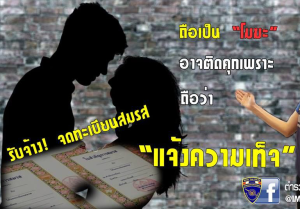In Thailand, a testator may disinherit any of their statutory heirs only by an express declaration of their intention to do so. Unlike in other countries in the South East Asia, The Civil and Commercial Code of Thailand does not provide for specific grounds for disinheriting a statutory heir but does provide for grounds from which an heir may be excluded by law to receive their share of inheritance.

Thai Civil and Commercial Code states that disinheritance of an heir can only be through an express provision of a will, or through a writing which is filed with the competent official. Also, the identity of the excluded heir must be clearly stated in the will or in the written instrument above mentioned. Nevertheless, it is implied that when the testator distributed all his assets through a will, all the heirs that are not included under the will are deemed to be disinherited.
An heir is entitled to receive their share of inheritance only when they are considered as capable to exercise such right under the Thai laws. Nevertheless, an heir who fraudulently diverts or conceals a part of the property of the testator which is more than their share to the prejudice of the other heirs are excluded to receive their part of the inheritance. When the concealment or diversion of the property amounts to less than their share in the inheritance, the heir guilty of the same shall be excluded to receive that part illegally diverted or concealed by them.
An heir in Thailand may also be excluded from succession under Section 1606 of the Thailand Civil and Commercial Code if they are deemed unworthy. An heir is considered as an unworthy under the following circumstances:
- If the heir is convicted by a final judgment of having wrongfully and intentionally caused the death of the testator or a person having a prior right over the inheritance. He is also considered as an unworthy if the heir is convicted by final judgment of an attempt to commit the aforementioned act;
- If the heir has been convicted by final judgment for an offense involving false charges or fabricating evidence against the testator;
- If the testator has been killed and the heir with knowledge of the perpetrator of the crime did not report the same to the proper authority, unless the heir is under 16 of age, of unsound mind or the spouse of the murdered or an ascendant or descendant;
- The heir caused the testator to make, revoke or change a will by fraud or under duress;
- The heir partly or wholly forged, destroyed or concealed a will.
Nevertheless, although the heir is considered unworthy under Thai laws, the testator may remove the exclusion due to unworthiness through a pardon made in writing. A declaration of inheritance may also be revoked by the testator either through a will or a written instrument deposited to a competent official. Speak to a lawyer if you wish to draft a will in Thailand for more information.





